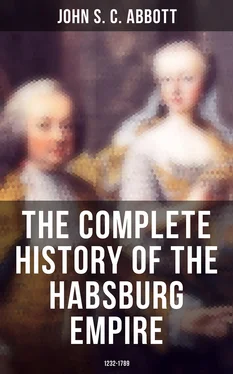While he was thus conquering discontent by the sword, and silencing murmurs beneath the tramp of iron hoofs, the diet was assembling at Frankfort to choose a new chief for the Germanic empire. Albert was confident of being raised to the vacant dignity. The splendor of his talents all admitted. Four of the electors were closely allied to him by marriage, and he arrogantly felt that he was almost entitled to the office as the son of his renowned father. But the electors feared his ambitious and despotic disposition, and chose Adolphus of Nassau to succeed to the imperial throne.
Albert was mortified and enraged by this disappointment, and expressed his determination to oppose the election; but the troubles in his own domains prevented him from putting this threat into immediate execution. His better judgment soon taught him the policy of acquiescing in the election, and he sullenly received the investiture of his fiefs from the hands of the Emperor Adolphus. Still Albert, struggling against unpopularity and continued insurrection, kept his eye fixed eagerly upon the imperial crown. With great tact he conspired to form a confederacy for the deposition of Adolphus.
Wenceslaus, the young King of Bohemia, was now of age, and preparations were made for his coronation with great splendor at Prague. Four of the electors were present on this occasion, which was in June, 1297. Albert conferred with them respecting his plans, and secured their coöperation. The electors more willingly lent their aid since they were exceedingly displeased with some of the measures of Adolphus for the aggrandizement of his own family. Albert with secrecy and vigor pushed his plans, and when the diet met the same year at Metz, a long list of grievances was drawn up against Adolphus. He was summoned to answer to these charges. The proud emperor refused to appear before the bar of the diet as a culprit. The diet then deposed Adolphus and elected Albert II. to the imperial throne, on the 23d of June, 1298.
The two rival emperors made vigorous preparations to settle the dispute with the sword, and the German States arrayed themselves, some on one side and some on the other. The two armies met at Gelheim on the 2d of July, led by the rival sovereigns. In the thickest of the fight Adolphus spurred his horse through the opposing ranks, bearing down all opposition, till he faced Albert, who was issuing orders and animating his troops by voice and gesture.
"Yield," shouted Adolphus, aiming a saber stroke at the head of his foe, "your life and your crown."
"Let God decide," Albert replied, as he parried the blow, and thrust his lance into the unprotected face of Adolphus. At that moment the horse of Adolphus fell, and he himself was instantly slain. Albert remained the decisive victor on this bloody field. The diet of electors was again summoned, and he was now chosen unanimously emperor. He was soon crowned with great splendor at Aix-la-Chapelle.
Still Albert sat on an uneasy throne. The pope, indignant that the electors should presume to depose one emperor and choose another without his consent, refused to confirm the election of Albert, and loudly inveighed him as the murderer of Adolphus. Albert, with characteristic impulsiveness, declared that he was emperor by choice of the electors and not by ratification of the pope, and defiantly spurned the opposition of the pontiff. Considering himself firmly seated on the throne, he refused to pay the bribes of tolls, privileges, territories, etc., which he had so freely offered to the electors. Thus exasperated, the electors, the pope, and the King of Bohemia, conspired to drive Albert from the throne. Their secret plans were so well laid, and they were so secure of success, that the Elector of Mentz tauntingly and boastingly said to Albert, "I need only sound my hunting-horn and a new emperor will appear."
Albert, however, succeeded by sagacity and energy, in dispelling this storm which for a time threatened his entire destruction. By making concessions to the pope, he finally won him to cordial friendship, and by the sword vanquishing some and intimidating others, he broke up the league. His most formidable foe was his brother-in-law, Wenceslaus, King of Bohemia. Albert's sister, Judith, the wife of Wenceslaus, had for some years prevented a rupture between them, but she now being dead, both monarchs decided to refer their difficulties to the arbitration of the sword. While their armies were marching, Wenceslaus was suddenly taken sick and died, in June, 1305. His son, but seventeen years of age, weak in body and in mind, at once yielded to all the demands of his imperial uncle. Hardly a year, however, had elapsed ere this young prince, Wenceslaus III., was assassinated, leaving no issue.
Albert immediately resolved to transfer the crown of Bohemia to his own family, and thus to annex the powerful kingdom of Bohemia to his own limited Austrian territories. Bohemia added to the Austrian provinces, would constitute quite a noble kingdom. The crown was considered elective, though in fact the eldest son was almost always chosen during the lifetime of his father. The death of Wenceslaus, childless, opened the throne to other claimants. No one could more imperiously demand the scepter than Albert. He did demand it for his son Rhodolph in tones which were heard and obeyed. The States assembled at Prague on the 1st of April, 1306. Albert, surrounded by a magnificent retinue, conducted his son to Prague, and to confirm his authority married him to the widow of Wenceslaus, a second wife. Rhodolph also, about a year before, had buried Blanche, his first wife. Albert was exceedingly elated, for the acquisition of Bohemia was an accession to the power of his family which doubled their territory, and more than doubled their wealth and resources.
A mild government would have conciliated the Bohemians, but such a course was not consonant with the character of the imperious and despotic Albert. He urged his son to measures of arbitrary power which exasperated the nobles, and led to a speedy revolt against his authority. Rhodolph and the nobles were soon in the field with their contending armies, when Rhodolph suddenly died from the fatigues of the camp, aged but twenty-two years, having held the throne of Bohemia less than a year.
Albert, grievously disappointed, now demanded that his second son, Frederic, should receive the crown. As soon as his name was mentioned to the States, the assembly with great unanimity exclaimed, "We will not again have an Austrian king." This led to a tumult. Swords were drawn, and two of the partisans of Albert were slain. Henry, Duke of Carinthia, was then almost unanimously chosen king. But the haughty Albert was not to be thus easily thwarted in his plans. He declared that his son Frederic was King of Bohemia, and raising an army, he exerted all the influence and military power which his position as emperor gave him, to enforce his claim.
But affairs in Switzerland for a season arrested the attention of Albert, and diverted his armies from the invasion of Bohemia. Switzerland was then divided into small sovereignties, of various names, there being no less than fifty counts, one hundred and fifty barons, and one thousand noble families. Both Rhodolph and Albert had greatly increased, by annexation, the territory and the power of the house of Hapsburg. By purchase, intimidation, war, and diplomacy, Albert had for some time been making such rapid encroachments, that a general insurrection was secretly planned to resist his power. All Switzerland seemed to unite as with one accord. Albert was rejoiced at this insurrection, for, confident of superior power, he doubted not his ability speedily to quell it, and it would afford him the most favorable pretext for still greater aggrandizement. Albert hastened to his domain at Hapsburg, where he was assassinated by conspirators led by his own nephew, whom he was defrauding of his estates.
Читать дальше












